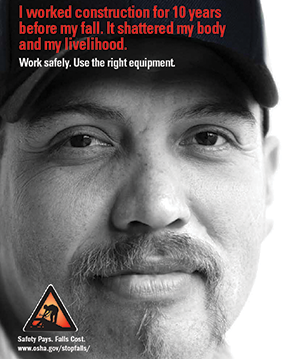IB Roof Systems joins NRCA’s One Voice initiative

|
NRCA has announced IB Roof Systems™ Inc., Grapevine, Texas, has joined its One Voice initiative as a partner member.
NRCA’s One Voice initiative is a transformational approach to addressing the roofing industry’s most critical issues and concerns—with one voice—to secure its future.
NRCA invites manufacturers, distributors, architects, engineers, consultants and service providers to fully engage with NRCA, as partners, and actively address the industry’s most pressing issues, including workforce and work certification; effecting change in Washington, D.C.; and increasing professionalism in all industry sectors.
Additional information about NRCA’s One Voice initiative is available at nrca.net/onevoice.
Join the National Safety Stand-Down May 3-7

|
The Occupational Safety and Health Administration’s eighth annual National Safety Stand-Down will be May 3-7 to raise awareness among employers and workers about the hazards of falls in the construction industry.
OSHA, the National Institute for Occupational Safety and Health, and the Center for Construction Research and Training will lead the effort to encourage employers to pause during their workdays for topic discussions, demonstrations and training regarding how to recognize hazards and prevent falls.
Additional information is available at osha.gov/stopfallsstanddown.
GAF names executive chairman for commercial roofing
 Altmeyer Altmeyer
|
GAF, Parsippany, N.J., appointed John Altmeyer executive chairman, GAF commercial roofing. Altmeyer assumed the role Feb. 1.
Altmeyer previously served for 21 years as president of Carlisle Construction Materials, Carlisle, Pa., which he grew to be the company’s largest and most profitable operating unit.
In his new role, Altmeyer will develop and lead a multiyear strategy focused on making GAF the top manufacturer in the commercial roofing market. Altmeyer will report to David Winter and David Millstone, co-CEOs of Standard Industries.
“With his deep industry experience, along with a proven track record of driving results and transforming businesses, John is singularly positioned to dramatically expand our commercial roofing business,” Winter says. “Under his leadership, we look forward to becoming the preeminent player in commercial roofing.”
COVID-19 pandemic complicates opioid addiction treatment

|
Opioid use and deaths from overdoses have surged throughout the U.S. and Canada during the COVID-19 pandemic, according to The Wall Street Journal.
In December 2020, the Centers for Disease Control and Prevention said the U.S. experienced a record 81,230 drug fatalities from May 2019 through May 2020 compared with 68,829 deaths from May 2018 through May 2019. In Canada, 1,628 opioid overdose deaths were recorded in the second quarter of 2020 compared with 1,029 deaths in the first quarter as the pandemic worsened.
The construction industry, where workers perform the same physically demanding tasks daily, has been particularly affected. Seeking relief for injuries, workers can get addicted to strong prescription drugs, such as fentanyl, oxycodone and morphine, and street drugs, such as heroin.
In a 2019 report by Barclays Research, New York, that examined data from the Bureau of Labor Statistics and the National Institute on Drug Abuse, analysts said opioid use in the U.S. has made workers in the construction industry less productive and increased industry costs. Construction workers are about six times more likely than workers in other manufacturing industrial and services industries to become addicted to opioids. In British Columbia, more than 20% of overdose deaths between 2011 and 2016 involved construction workers, according to Statistics Canada.
The risk of addiction has grown amid the isolation and limited access to support clinics caused by COVID-19 restrictions. In April 2020, Vancouver-based nonprofit Construction Industry Rehabilitation Plan saw a 47% increase in calls from distressed users, and the number of workers currently registered in the program is at the highest level in at least four years.
Losing workers to opioid use also is exacerbating the industry’s labor shortage. According to a fourth-quarter survey of the commercial construction industry by the U.S. Chamber of Commerce, 83% of contractors reported having difficulty finding skilled workers. Of those companies, nearly 40% turned down work because they do not have enough workers.
Financially, a worker with a substance abuse disorder costs a company an average of $4,700 yearly in health care costs—62% more than the $2,900 estimated for a nonuser, according to the National Safety Council.
Some industry groups are increasing efforts to address the issue. In 2018, the Pennsylvania-based Keystone Contractors Association joined with the National Safety Council to create educational materials for companies to teach workers about the dangers of prescription painkillers and drug use. The groups also persuaded the state legislature to declare the last week of July “Construction Opioids Awareness Week.” In addition, there are treatment and rehabilitation programs being led by unions.
SPI Energy acquires consumer contracts of Petersen-Dean
SPI Energy Co. Ltd., Santa Clara, Calif., a global renewable energy company and provider of photovoltaic and electric vehicle solutions, has announced SolarJuice American Inc., a wholly owned subsidiary of SPI Energy, acquired the consumer contracts of Petersen-Dean Inc., Pleasanton, Calif., a full-service roofing and solar company.
Founded in 1984, Petersen-Dean was one of the U.S.’ largest independently owned solar and roofing companies specializing in new residential construction. At its peak, the company employed nearly 3,000 solar and roofing employees in nine states: Arizona, California, Colorado, Florida, Hawaii, Louisiana, Nevada, Oklahoma and Texas. Petersen-Dean was generating $300 million to $400 million in sales annually with favorable profit margins before the COVID-19 pandemic took a toll.
“Our acquisition of these consumer contracts could save thousands of U.S. jobs that were in jeopardy following Petersen-Dean’s Chapter 11 filing in June 2020,” says Xiaofeng Peng, chairman and CEO of SPI Energy. “This also is a major win for us as we work to accelerate our penetration in the vast U.S. markets and create better renewable products and services for American residential customers.”
NRCA releases training package for foremen

|
NRCA has made available its Training for Roof Application Careers foreman package designed to help foremen prepare for NRCA ProCertification® and show workers who are training to be foremen what to expect.
The foreman management training package joins four existing TRAC packages: asphalt shingle installation, thermoplastic roof membrane installation, steep-slope onboarding and low-slope onboarding. Foremen who engage with the foreman management training package will navigate through scenarios that reinforce safety, customer service, quality and productivity—the four pillars upon which NRCA ProCertification is built. All scenarios are available for download, and participants are encouraged to discuss the best answers for their work environments with their supervisors.
A one-time TRAC package purchase provides unlimited use of the training materials to enable employers to train employees at any time. Additional information about TRAC is available at nrca.net/education/trac.
Nonresidential construction expected to decline in 2021
A January 2021 consensus forecast from The American Institute of Architects shows slowing demand at architecture firms in 2020 is expected to contribute to a projected 5.7% decline in construction spending for 2021, according to forconstructionpros.com.
The AIA Consensus Construction Forecast Panel of leading economic forecasters expects steep declines in construction spending this year for office buildings, hotels, and amusement and recreation centers. Health care and public safety are the only major sectors expected to produce gains.
Growth in nonresidential construction is expected for 2022, with 3% gains projected for the overall building market matched by the commercial and institutional sectors.
“The December 2020 jobs report confirmed the economy needs additional support in order to move to a sustainable economic expansion,” says AIA Chief Economist Kermit Baker. “As pandemic concerns begin to wane and economic activity begins to pick up later in 2021, there is likely to be considerable pent-up demand for nonresidential space, leading to anticipated growth in construction spending in 2022.”



